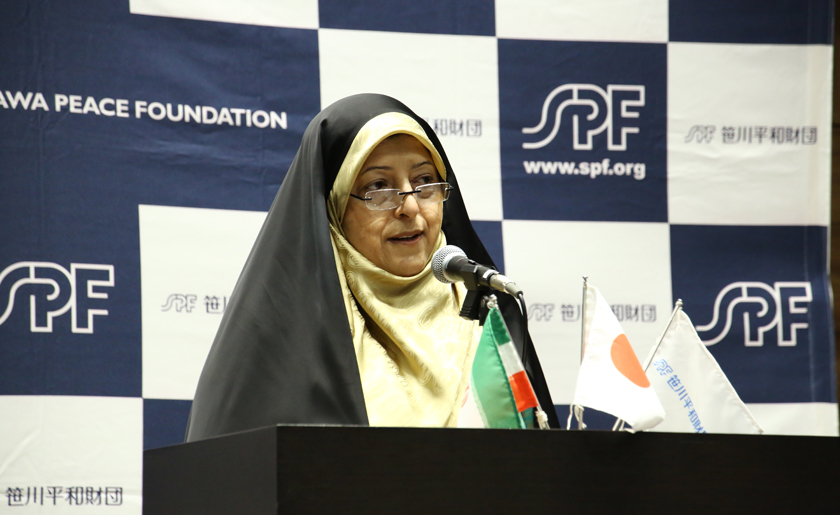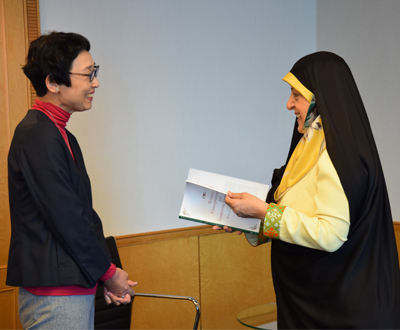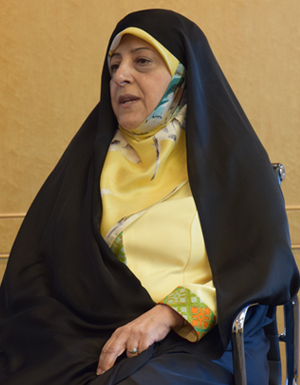In this recent trip, Prime Minister Abe came to extend first of all the friendship of the Japanese people and the Japanese government, which is very important during these difficult times. He also promoted bilateral relations, particularly economic relations, which are again very important for Iran. Japanese firms have longstanding investments in Iran. We’re very well familiar with Japanese corporations like Sony, Panasonic, and Toyota. They’ve invested in Iran and they’ve also benefitted a lot from Iranian markets, and now is the time that they need to stand by their previous commitments in spite of the difficult times and stand by the Iranian nation.
The prime minister also met with the supreme leader and the president. The position of Iran was clear. The Iranian nation is very proud and resilient, and it’s very natural that we wouldn’t agree to negotiations under pressure. I know that Prime Minister Abe – and the leader and the president mentioned this – had very good intentions, but during the week between the prime minister’s meeting with the American president and his visit to Iran, the Americans imposed a new series of sanctions on the Iranian government. That sent a clear message. They could have at least postponed those sanctions until after his visit to Iran, and that would’ve given Prime Minister Abe a stronger position, but that didn’t happen.
It’s very clear that the other side is illegally putting pressure on the Iranian people, and the Iranian people are facing difficult times. There's a lot of pressure on our government, our economy, the people, the women, and the families. Economic pressures tend to create a lot of difficulties for working mothers or women heads of household because they usually have dual responsibilities, and when economic conditions become more difficult and when there is inflation, that really puts a lot of pressure on women and families.
We hope that Japan will continue its efforts and we know that the prime minister will take this message of the Iranian people to the G20. I also hope he takes the message of the Iranian woman, that in spite of the difficulties and the pressures, the Iranian women are resilient and we hope these issues are resolved through a rational and legal basis, which was available initially through the Joint Comprehensive Plan of Action (JCPOA) nuclear deal, and we hope that the current course of sanctions against the Iranian people will change.
Building off of that, could you talk about Japan's role in resolving these complex international issues in the Middle East and internationally?Dr. Ebtekar: Japan can serve as a bridge, which means conveying a correct message. Sometimes when you're in a conflict or when you're negotiating, one party might not understand the position of the other party. I think that Japan plays an important role in conveying the correct message regarding what both sides understand and believe. Also, I think that escalation of tensions and entering our airspace, it was very natural that we would defend ourselves. This is an indication of Iran’s very strong defense capabilities and this is important for an independent country like Iran living in a very volatile region with so many American bases around us. We look to countries that are members of the JCPOA or that are supporting the JCPOA to play their role in terms of compensating Iran.
You mentioned that Prime Minister Abe would be conveying a message to the G20, which will be held in Japan later this week.* European leaders and the U.S. president will be there as well. What message do you have for those world leaders?Dr. Ebtekar: Every nation has the right to decide for its own future and its own destiny. The Iranian people have played a pivotal role in peace and security. Our message is that we have the right to peace, we have the right to advancement and development, and that these sanctions are illegal. It’s a form of economic war or economic terrorism, as our president puts it, against our nation, and other nations have to stand up to these pressures and support Iran. I think the message to the American government is that they have to change course against the Iranian nation and the international community needs to support Iran in these difficult times.
*Note: This interview was conducted just prior to the G20 Summit held in Tokyo, Japan on June 28-29, 2019.
To view Dr. Ebtekar’s full lecture at SPF, please visit our
video page.
For more from the Middle East and Islam Program Department, please visit the
program page.


